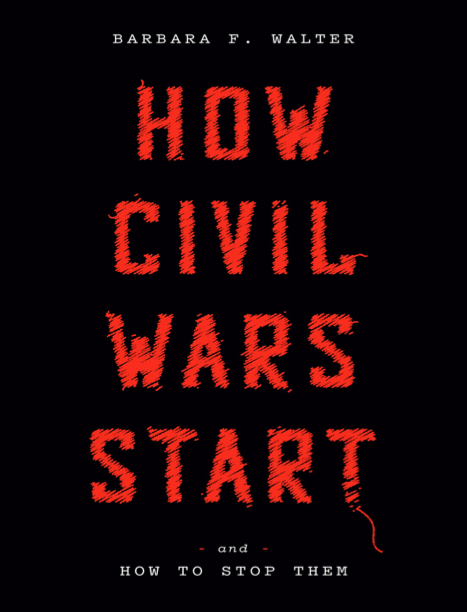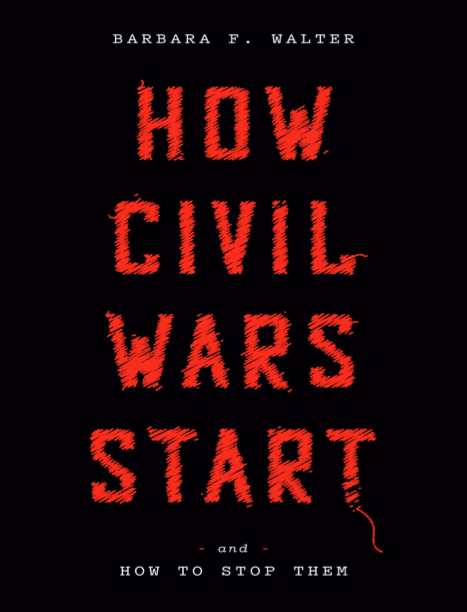How Civil Wars Start: And How to Stop Them | Barbara F. Walter
![]()
Barbara F. Walter Violence in Society Democracy Military History History of Individual Wars Ideologies & Doctrines Politics & Government New York Times Bestseller
- درباره کتاب
- بخشی از کتاب
- نظرات
NEW YORK TIMES BESTSELLER • A leading political scientist examines the dramatic rise in violent extremism around the globe and sounds the alarm on the increasing likelihood of a second civil war in the United States
“Like those who spoke up clearly about the dangers of global warming decades ago, Walter delivers a grave message that we ignore at our peril.”—David Remnick, The New Yorker
Political violence rips apart several towns in southwest Texas. A far-right militia plots to kidnap the governor of Michigan and try her for treason. An armed mob of Trump supporters and conspiracy theorists storms the U.S. Capitol. Are these isolated incidents? Or is this the start of something bigger? Barbara F. Walter has spent her career studying civil conflict in places like Iraq and Sri Lanka, but now she has become increasingly worried about her own country.
Perhaps surprisingly, both autocracies and healthy democracies are largely immune from civil war; it’s the countries in the middle ground that are most vulnerable. And this is where more and more countries, including the United States, are finding themselves today.
Over the last two decades, the number of active civil wars around the world has almost doubled. Walter reveals the warning signs—where wars tend to start, who initiates them, what triggers them—and why some countries tip over into conflict while others remain stable. Drawing on the latest international research and lessons from over twenty countries, Walter identifies the crucial risk factors, from democratic backsliding to factionalization and the politics of resentment. A civil war today won’t look like America in the 1860s, Russia in the 1920s, or Spain in the 1930s. It will begin with sporadic acts of violence and terror, accelerated by social media. It will sneak up on us and leave us wondering how we could have been so blind.
In this urgent and insightful book, Walter redefines civil war for a new age, providing the framework we need to confront the danger we now face—and the knowledge to stop it before it’s too late.
Praise for How Civil Wars Start
“It turns out that there is a discipline that you might call ‘civilwarology’—the study of the factors that lead to civil war. . . . Barbara F. Walter became a civilwarologist nearly a quarter of a century ago and her entry is evidently well-thumbed in the Rolodexes of the CIA and the U.S. State Department. In other words, she knows what she’s talking about—which makes this book rather scary.”—The Times (U.K.)
Editorial Reviews
Review
“Rigorously researched and lucidly argued, How Civil Wars Start is an arresting wake-up call.”—Esquire
“One of the most-discussed titles of the moment.”—Carlos Lozada, The Washington Post
“As a political scientist who has spent her career studying conflicts in other countries, [Walter] approaches her work methodically, patiently gathering her evidence before laying out her case.”—Jennifer Szalai, TheNew York Times
“[Barbara F.] Walter’s How Civil Wars Start is the civil-conflict equivalent of How Democracies Die by Steven Levitsky and Daniel Ziblatt—a much-needed warning that uses cross-national research to examine the United States. Given how prescient Levitsky and Ziblatt were, and how expert Walters is (she is a leading scholar of civil wars), it is a warning to heed. I’ve been skeptical of the notion that the United States is on the verge of another civil war. Walter has made me reconsider. . . . This is a book that everyone in power should read immediately.”—Jacob S. Hacker, The Washington Post
“Barbara F. Walter, a political scientist at the University of California, San Diego, has interviewed many people who’ve lived through civil wars, and she told me they all say they didn’t see it coming. . . . This is worth keeping in mind if your impulse is to dismiss the idea that America could fall into civil war again.”—Michelle Goldberg, The New York Times
“Drawing on her deep understanding of the causes of intra-state violence . . . Barbara F. Walter argues, chillingly, that many of the conditions that commonly precede civil wars are present today in the United States.”—Steven Levitsky and Daniel Ziblatt, authors of How Democracies Die
“How Civil Wars Start is a stop sign for us—and an imperative book for our time. The evidence-based preventative measures could not be more urgent. Read and act.”—Ibram X. Kendi, author of How to Be an Antiracist
“How Civil Wars Start is a sobering but engrossing book. It is so tempting to ignore or deny Walter’s carefully researched and reasoned conclusions, which is precisely the response she is warning us against. . . . Highly recommended for anyone interested in preserving American democracy.”—Anne-Marie Slaughter, president and CEO, New America
“This engaging book from one of the country’s most authoritative scholars of civil wars is a dire warning. Governing amid diversity is an incredible challenge, and this book is an important guide to preserving our democracy.”—Kori Schake, Director of Foreign and Defense Policy Studies, American Enterprise Institute
“How Civil Wars Start brilliantly illuminates the history of civil wars and the profound dangers to our union today, serving as both a warning about the stakes in our politics and a call to action . . .”—Ben Rhodes, author of After the Fall
“Barbara F. Walter has done a great service in demonstrating the risks the United States is now courting—and how they might be offset.”—James Fallows, co-author of Our Towns
About the Author
Barbara F. Walter is the Rohr Professor of International Relations at the School of Global Policy and Strategy at the University of California, San Diego. A life member of the Council on Foreign Relations, Walter helps to run the award-winning blog Political Violence at a Glance and has written for The Washington Post, The Wall Street Journal, Los Angeles Times, Reuters, and Foreign Affairs.










هنوز نظری ثبت نشده
اولین نفری باشید که نظر میدهید
ثبت نظر